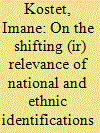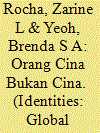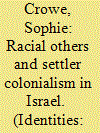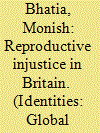|
|
|
Sort Order |
|
|
|
Items / Page
|
|
|
|
|
|
|
| Srl | Item |
| 1 |
ID:
190771


|
|
|
|
|
| Summary/Abstract |
Through semi-structured interviews with Senegalese fishermen, this article examines their displacement following the depletion of fishing stocks in Senegalese waters owing to the activities of European and Asian industrial fleets over the last two decades. While there has been some recognition in scholarship that extractivism leads to dire precarity and displacement within local populations, it has not been demonstrated how exploitations at sea are dependent on the displacement of the indigenous people for corporate gains. Thus, this article conceptualizes displacement of local Senegalese fishermen as the product of an active, arguably deliberate process, solely motivated by corporate gains to the detriment of their communal and human life. Furthermore, the article shows that displacement can take on multiple forms such as economic and temporal as well as physical movement. Data is drawn from eighteen semi-structured interviews with fishers from three fishing villages.
|
|
|
|
|
|
|
|
|
|
|
|
|
|
|
|
| 2 |
ID:
190765


|
|
|
|
|
| Summary/Abstract |
This paper focuses on the artistic-political renderings of the sacred feminine deity of the Romani people, Sara Kali. While her genealogy is shrouded in mystery and controversy, Sara Kali is regarded as the uncanonised saint protector of oppressed, disenfranchised and vulnerable peoples, as well as the protector of pregnant women. Venerated by some Romanies in both spiritual registers of sainthood and audacious political activism, Sara Kali epitomises motherly love and feminine strength. The argument posited in this paper is that Sara Kali fosters a culture of commemoration, materialised in contemporary artistic productions whose political underpinnings resist the unbridled Romaphobia and its venomous consequences. We argue that the cultural artistic memory of Sara Kali becomes a political tool in empowering Romanies to express their identity concerns as well as centuries of oppression and injustice.
|
|
|
|
|
|
|
|
|
|
|
|
|
|
|
|
| 3 |
ID:
190770


|
|
|
|
|
| Summary/Abstract |
The UK's decision to leave the EU was partly influenced by a desire to reduce immigration. This followed a period of increased Euroscepticism, and an ‘othering’ of those of a different background, nationality or religion, and ultimately the EU itself. Post-Brexit, this has been linked to a rise in hate crime in England, and the referendum decision has been characterised as an expression of a strengthened English identity. Hostility towards those perceived as ‘foreigners’ or ‘others’ seems also to have affected people from the other nations within the British Isles, with speculation that Brexit might lead to the break-up of the UK. Here, we focus on Scots living or who have lived in England and, while their experiences are mixed, it appears that some hostility towards Scots (and indifference to Scotland) has grown. We speculate that this and additional political tensions may, eventually, bring about the end of the union.
|
|
|
|
|
|
|
|
|
|
|
|
|
|
|
|
| 4 |
ID:
190767


|
|
|
|
|
| Summary/Abstract |
Based on three rounds of in-depth interviews, this article discusses the various ways in which children negotiate ethnic and national identities in a majority-minority city. I examine which identity labels children identify with, which relevance they attach to those labels, how they define these inclusively or exclusively and what these labels reveal about their senses of belonging. Children negotiate identity in myriad and creative ways and, while doing so, challenge public and political discourses by creating inclusive categories which transcend ethnic or national boundaries. I further show how, approximately 20 months after the first research round, the children retrospectively reflect on their self-identifications, may alter their initially chosen identity labels, and critically question the importance they once attached to those identities. The results contribute to a deeper understanding of children’s reflexivity and agency while dealing with their identity in a super-diverse environment.
|
|
|
|
|
|
|
|
|
|
|
|
|
|
|
|
| 5 |
ID:
190769


|
|
|
|
|
| Summary/Abstract |
This paper explores how being Peranakan is related to (not) being Chinese in Singapore, intertwining descent, racial categorization, cultural practice and choice. Tracing the complex history of Peranakan identity, it highlights how the social construction of race has created a hybrid yet ethnically Chinese identity, with a rich cultural heritage largely relegated to the past. Drawing on theories of racial formation and the racial state, this study illuminates racial ascription and categorization in Singapore. Interviews with 32 Peranakan individuals highlight the positioning of Peranakan identity within the multiracial framework, subsumed within the Chinese category. Examining the idea of being ‘Orang Cina Bukan Cina/Chinese but not Chinese’, the paper addresses nuances of locating the mixedness of hybridity in a racially structured context. Juxtaposed against the recent revitalization of Peranakan material culture, Peranakan as ‘locally born’ illustrates how this complex identity is used in everyday life by individuals and the state.
|
|
|
|
|
|
|
|
|
|
|
|
|
|
|
|
| 6 |
ID:
190766


|
|
|
|
|
| Summary/Abstract |
Studies show that racial and ethnic identity can significantly improve mental health and well-being among marginalized ethnoracial groups who experience racism and discrimination. However, the relationships between Pan-African identity, psychological well-being, and mental health have received less attention. Using a national sample of African American adults, I examine whether Pan-African identity impacts psychological well-being and self-rated mental health. The results show that respondents who feel closer towards members of the African diaspora and Black people in Africa and prefer Pan-African labels have better self-rated mental health and higher levels of self-esteem. Moreover, the analysis finds that respondents who prefer Pan-African labels have higher levels of mastery. Although self-esteem explains the self-rated mental health benefits of both Pan-African closeness and Pan-African label preferences, only mastery explains the relationship between Pan-African label preferences and self-rated mental health. This study demonstrates the possible psychological benefits of a globalized identity for marginalized groups in Eurocentric contexts.
|
|
|
|
|
|
|
|
|
|
|
|
|
|
|
|
| 7 |
ID:
190768


|
|
|
|
|
| Summary/Abstract |
From 2006, thousands of migrants crossed into Israel after travelling through the Sinai Desert. The majority came from Eritrea and Sudan, seeking asylum from state violence. Israel’s government classified them as ‘infiltrators’ using a law enacted in 1954 to criminalize Palestinians seeking to return to expropriated lands. Drawing on fieldwork in Israel in 2018–2019, the article examines dimensions of a process of political subjectivation among these migrants and citizens in solidarity with them. It is concerned with the performative effects of a struggle migrants waged for refugee status by contesting their construction in government discourse as infiltrators. It argues their claims became refracted through debates over contours of a fissured collective self, which challenged the limits of political community. While their claims disrupted the order’s dividing lines, the article argues the latter proved durable, that conditions of possibility for disruptive speech are mediated by overlapping structures of colonialism and racializations.
|
|
|
|
|
|
|
|
|
|
|
|
|
|
|
|
| 8 |
ID:
190764


|
|
|
|
|
| Summary/Abstract |
This article aims to show how race, gender, class, and other identity markers intersect to oppress, control and discipline poor and illegalized single migrant mothers and pregnant women from the Global South. The article draws on evidence from three ethnographic studies conducted between 2008 and 2017 to shed light on the predicaments of mothers and pregnant women excluded from the welfare safety-net, who were flying under the radar due to the fear of deportation. It shows how (cr)immigration controls render women vulnerable to victimization and harm. The second part of the article addresses imprisonment and punishment, treatment by the criminal justice system, and separation from children placed in foster care. The evidence strongly suggests that controls in Britain disrupt the core principles of reproductive justice, including reproductive autonomy and health, and to parent children in a safe and healthy environment without fear of retaliation from the government. This is being termed as racist-gendered state violence.
|
|
|
|
|
|
|
|
|
|
|
|
|
|
|
|
|
|
|
|
|